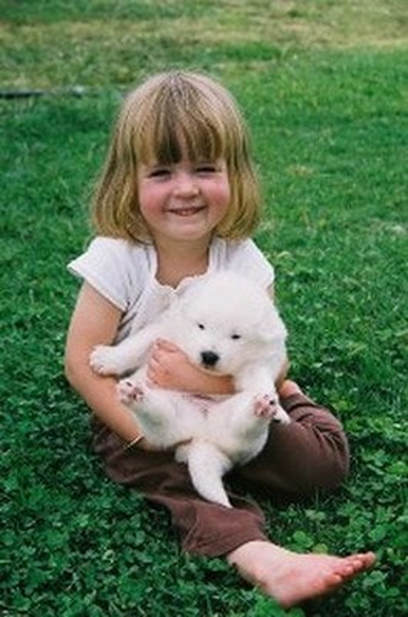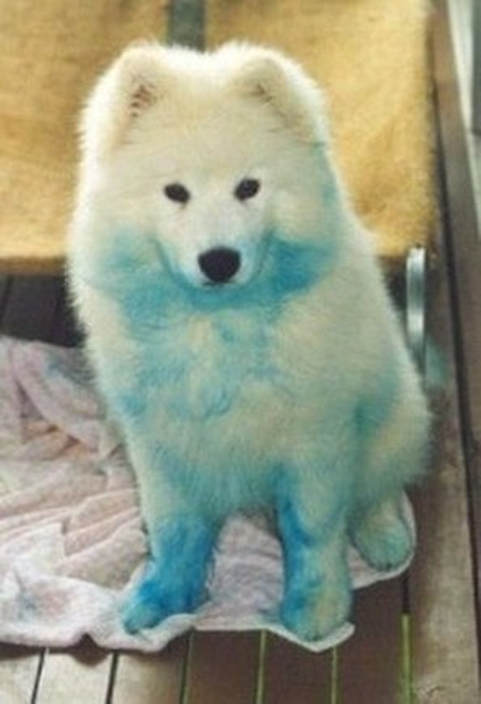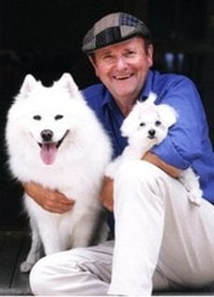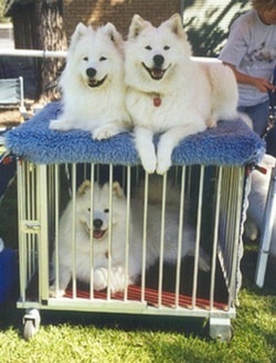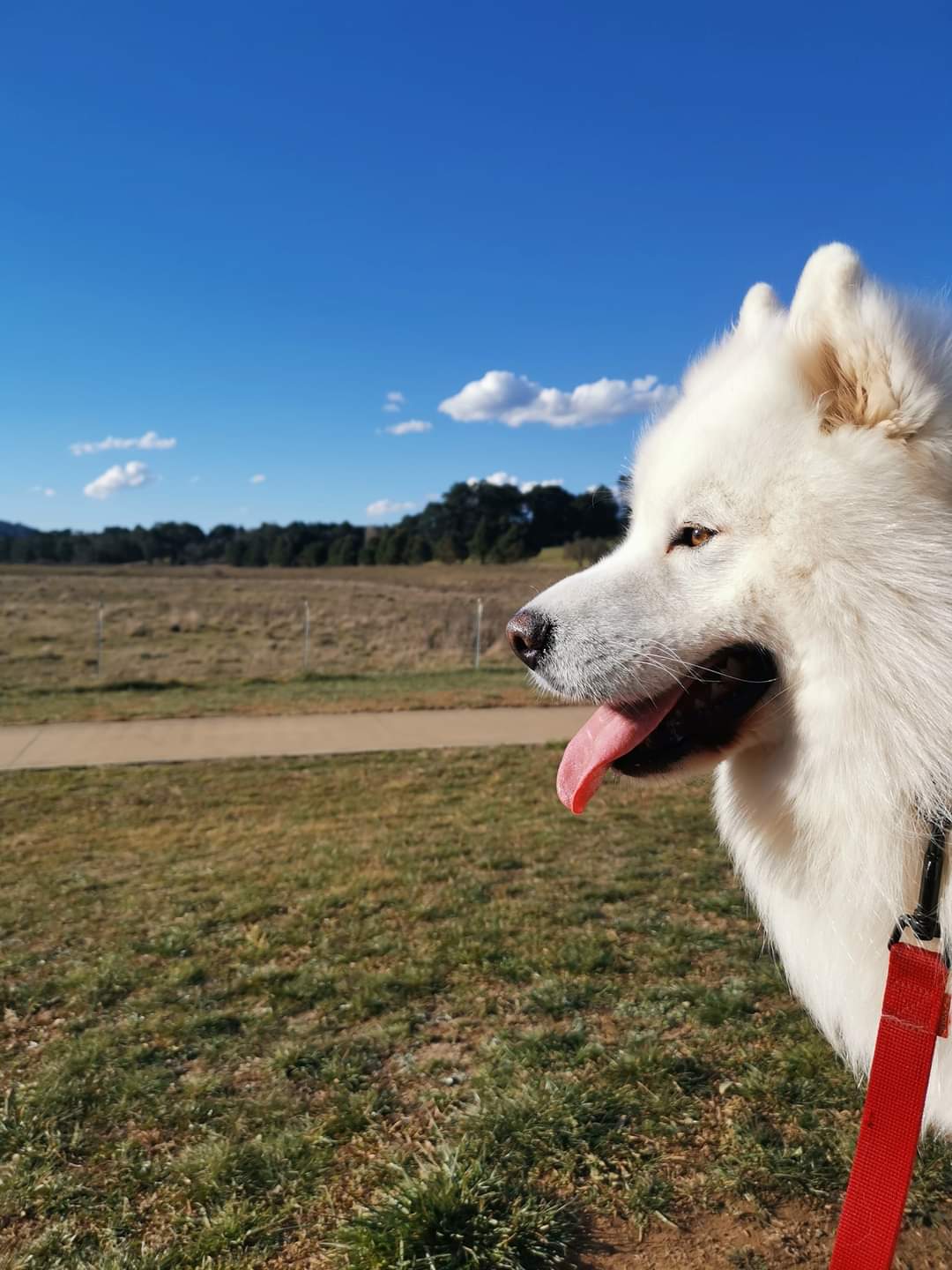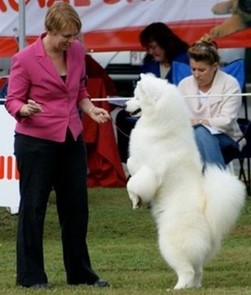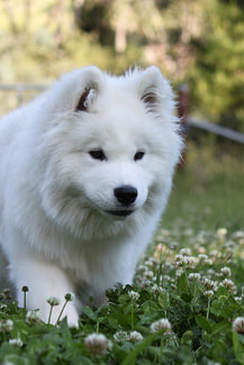Choosing a Samoyed & General Care
CHOOSING YOUR SAMOYED
|
The Samoyed is one of the oldest breeds known to man being descended, without mixture, from the dog that accompanied the "Samoyede" tribesmen during their migrations in far north Europe.
The Samoyed is a medium sized dog with a thick white coat and a big, permanent smile that reflects the happy-go-lucky nature of the breed. Their gentle, even tempered nature makes them a delightful and devoted family pet. Beautiful, graceful and affectionate the Samoyed has been called the dog that carries the spirit of Christmas in its face and heart the whole year through. Ahead of you are many years (12-15) of love, fun, affection and loyalty from what we consider the most beautiful dog in the world. The Samoyed has a real need for human association and affection, having lived so closely with nomadic peoples over many centuries. He herded the tribe's reindeer, pulled their sleds, guarded their camps from wolves and bears and the pups were even used to keep their children warm in their reindeer skin tents. He is a true companion, always willing to please and never showing any aggression to humans. He is patient beyond belief, especially with children, and is only truly happy when he is with you as part of the family. |
Think First Before You Buy!
|
This appealing little bundle of fluff is going to grow into a dog that will stand between 46 to 51 cm ( for a female) 51 to 56 cm (for a male) at the shoulder, sometimes even bigger. The Samoyed is an individual, a free thinker, independent and very intelligent. He will need a lot of guidance and training during the formative months to mould his personality into the well-adjusted family member you require.
A Samoyed must be groomed regularly, needs exercise on a regular basis and has to feel part of the family. He should be trained properly and also fed a good balanced diet. A Samoyed loves to be beside you all the time. This gorgeous puppy may BARK, DIG, CHEW, WANDER, CHASE THE CAT, and DIRTY IN THE HOUSE. He needs your time and patience. If you don't have sufficient of either of these, don't buy a Samoyed. His coat needs attention, he needs daily exercise, proper feeding, and he also needs mental stimulation (being played with and shown affection). He needs an enclosed yard and a quiet warm place to sleep, but most of all he needs YOU. |
Everything you put into a Samoyed he will repay one-hundred-fold. If you just want a dog to keep in the backyard and look pretty, a Samoyed is not for you. A bored dog is a naughty dog. Barking, digging, chewing and roaming are usually symptoms of boredom.
Remember There Are No Bad Samoyeds, Only Bad Owners
|
Once you feel confident in your choice, and the breed will suit your life-style, talk to as many owners and breeders as you can and ask lots of questions on the breed.
Perhaps spend time with owners of Samoyeds at dog shows or events run by the breed specialty club. Read as many books as you can on the breed and get to know this lovely dog. Be sure to buy your puppy from a reputable breeder. A responsible breeder will be willing to provide ongoing support and advice and will be only too willing to answer all your questions no matter how foolish you may think they are. |
GENERAL CARE
|
Before bathing, a Samoyed must always be thoroughly groomed to remove any loose or dead hair. Bathing without combing first may make it very difficult to dry and groom the dog later. During the shedding season if the Samoyed has not been thoroughly groomed before bathing, the loose hair can turn into matts which are very hard to remove. Little bathing is required and there is none of the doggy odour often found amongst other dog breeds.
Samoyed coats are usually white, although cream or biscuit colour is acceptable. As a general rule a dog will have a bigger coat than a bitch. Both have thick coats, with a soft undercoat and a harsher outer coat. A properly groomed Samoyed is stunning; with a magnificent coat displaying sparkling, silver tips, but don't forget that a lot of time and effort has been put into the grooming of that beautiful dog. |
The Samoyed coat requires regular grooming to keep it healthy and free of matts, parasites and loose hair. The Samoyed has a major shed (blow) at least once a year where the undercoat sheds in a spectacular way and requires many hours of work combing out. This shedding lasts approximately one month, with relatively no shedding during the rest of the year. The coat should be groomed regularly, at least once a week with a good comb through and once a fortnight paying particular attention to elbows, hocks and ears to ensure that the hair does not become matted at these points. In Siberia, where the breed originated, the combings from the hair were converted into human clothing. There are many people even now that use the Samoyeds hair for spinning into 'wool' and knitting jumpers.
Do not clip a Samoyed coat in summer as the dog will cope very well if not better than many shorter coated breeds in the hot weather as the Samoyeds thick coat acts as insulation and the coat colour reflects the light. Think of a sheep in the middle of summer. But make sure that your dog always has plenty of cool water and somewhere shady to lay.
Do not clip a Samoyed coat in summer as the dog will cope very well if not better than many shorter coated breeds in the hot weather as the Samoyeds thick coat acts as insulation and the coat colour reflects the light. Think of a sheep in the middle of summer. But make sure that your dog always has plenty of cool water and somewhere shady to lay.
|
The Samoyed needs daily exercise and enjoys obedience training but this can be a challenge. You must make the work fun and commands should be given with enthusiasm. You should be persistent and patient when training as the dog will become easily bored and distracted. Don't forget their original environment demanded a very intelligent breed with an independent nature.
This breed thinks for themselves and "if you keep throwing that ball away then you obviously don't want it". But after saying all that, there are many Samoyeds proudly holding their obedience certificates. |
health
|
The Samoyed is a hardy robust breed, able to survive in harsh conditions, so only the fit and healthy dogs survived to be able to breed. This means a lot of common hereditary problems found in man made breeds are not present in the Samoyed.
Hip Dysplasia is one problem that has occurred in the breed. It is not a major problem as it has been in other breeds, but responsible breeders are aware of condition, and are taking steps to ensure against an increase. Whether parents have been X-rayed or not, it is not possible to guarantee that the puppy is free of the condition. We can only assess the status of our breeding stock, breeding only dogs with low scores. The formation of the joint is governed primarily by the dog’s genetic makeup, although environment and lifestyle can play a part. |
It is now common practice for Breeders to test for Eye problems, some of those that are known to have occurred in Samoyeds are Cataracts, Corneal Dystrophy, Distichiasis, Glaucoma, and Progressive Retinal Atrophy (PRA). Other health problems occasionally seen are Thyroiditis, Cardiac problems and Diabetes.
Vaccination is vital. Infectious diseases such as Canine Distemper, Canine Hepatitis, Canine Parvovirus, Parainfluenza and Bordetella can now all be prevented with a series of injections in the first few months and then a yearly booster. Apart from vaccination, the best protection against infections and illness is to keep your Samoyed fit and healthy.
Vaccination is vital. Infectious diseases such as Canine Distemper, Canine Hepatitis, Canine Parvovirus, Parainfluenza and Bordetella can now all be prevented with a series of injections in the first few months and then a yearly booster. Apart from vaccination, the best protection against infections and illness is to keep your Samoyed fit and healthy.
|
Puppies would help keep Samoyedic children warm in the chooms. |
